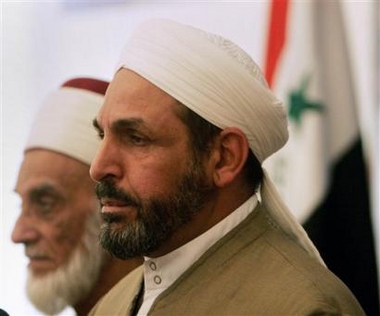|
Sunni Arabs join forces for Iraq elections
(AP)
Updated: 2005-10-27 08:59 Despite the Sunni groups' announcement, an influential group of hardline
Sunni Arab clerics, the Association of Muslim Scholars, declared Wednesday that
it would not join the political process and denounced the constitution. The
association is believed to have links to some insurgent groups and was at the
forefront of the January boycott.
"The whole project was American," association spokesman Abdul Salam
al-Kubaisi said of the constitution. "We already declared that the constitution
will be only benefit the occupation and the other forces who collaborated."
Iraqi officials announced Tuesday that voters had approved the new
constitution, and immediately attention turned to preparations for the December
balloting. The announcement set off a chain of back-room dealmaking as political
blocs sought to forge new alliances before the Friday deadline for them to file
candidate lists.
As Sunni groups were coming together, the Shiite alliance which swept most of
the parliament seats last January appeared to be fraying. Iraq's leading Shiite
cleric, Grand Ayatollah Ali al-Sistani, has decided not to endorse the Shiite
coalition which ran under his banner in January, according to associates on both
sides.

Senior Clerics of the Association of Muslim
Scholars in Iraq, Abdul Salam al-Kubaisi, right, and Ibrahim al-Modrris
deliver a press conference in Baghdad, Iraq, Wednesday, Oct. 26,
2005.[AP] | Close associates said al-Sistani's decision reflected his disappointment with
Prime Minister Ibrahim al-Jaafari's Shiite-led government. Al-Sistani's
endorsement of the Shiite coalition was seen as the principal reason for its
success in the Jan. 30 election.
If al-Sistani does not change his mind, the December election could produce a
major realignment of the country's political landscape.
It remains unclear, however, whether political change will produce a quick
decline in the insurgency. The U.S. military death toll in the conflict rose to
2,001 with the death of an American soldier in a vehicle accident near Camp
Bucca in southern Iraq.
In other developments, the U.S. military said that an American warplane
struck a suspected insurgent safe house near the Syrian border Wednesday and may
have killed a senior al-Qaida in Iraq figure who assisted in smuggling Syrian
and Saudi fighters into Iraq.
Without giving details, the military said intelligence sources indicated the
figure, identified only as Abu Dua, was inside the house but his body has not
been recovered. It added that Abu Dua had also set up religious courts to try
Iraqis charged with supporting the Iraqi government and coalition forces.
The Iraqi government said another al-Qaida leader who took part in at least
three videotaped beheadings of Iraqis was killed in Mosul last Sunday. Nashwan
Mijhim Muslet, also known as Abu Tayir and Abu Zaid, was a senior al-Qaida
member in Mosul wanted for attacks against U.S.-led coalition troops and Iraqi
security forces.
|